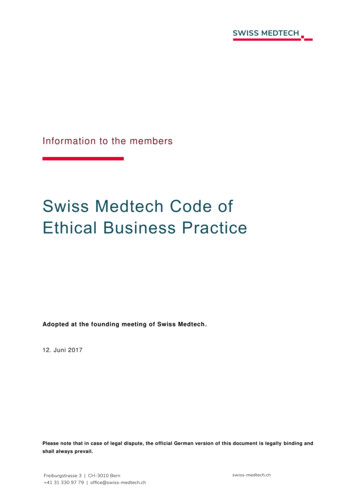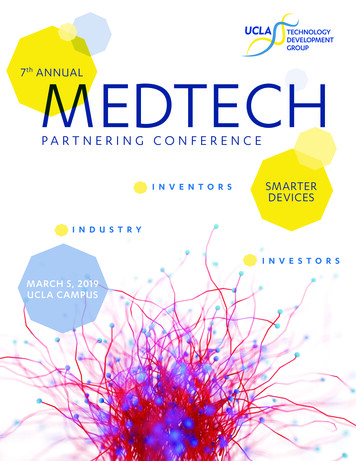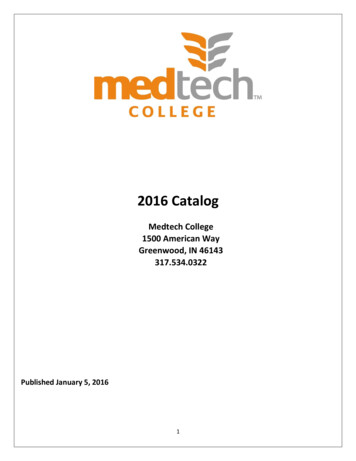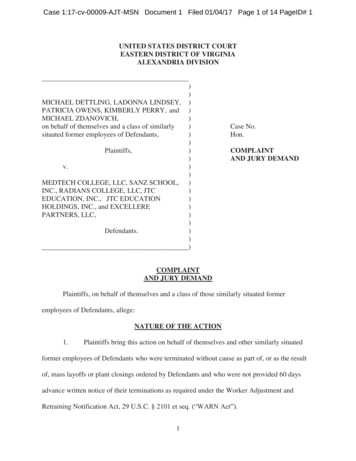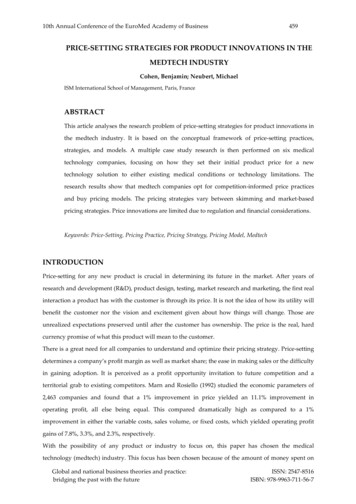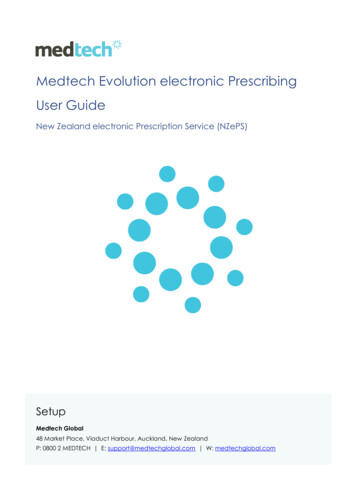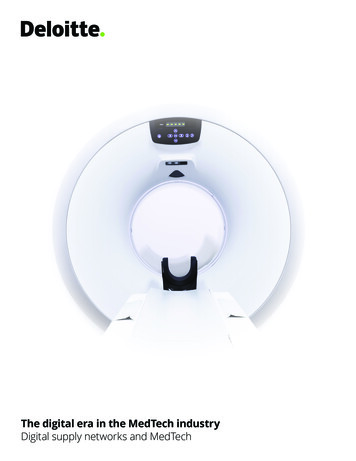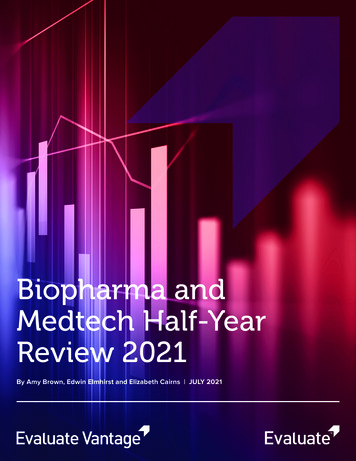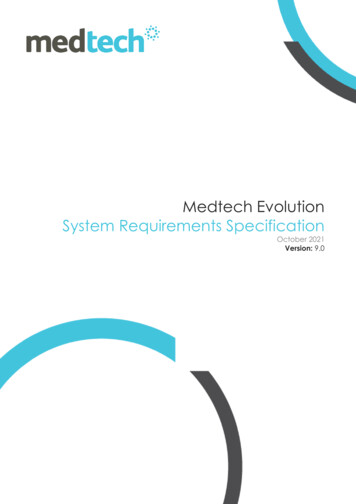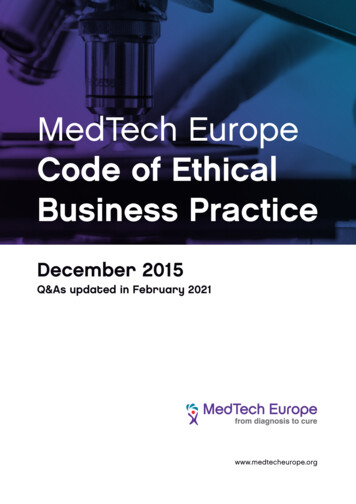
Transcription
MedTech EuropeCode of EthicalBusiness PracticeDecember 2015Q&As updated in February 2021
ContentsINTRODUCTION.4Promoting an Ethical Industry.4Key Legislation.4Aims and Principles of the Code.5Interpreting the Code.6Administering the Code.6Implementation and Transition Period.7Part 1: Guidelines on the Interactions with Healthcare Professionals and Healthcare Organisations.8Chapter 1: General Criteria for Events.9Chapter 2: Third Party Organised Educational Events.131. Third Party Organised Educational Conferences.132. Third Party Organised Procedure Training.143. Transition Period: Support of Individual Healthcare Professionals to Third Party Organised Educational Events.15Chapter 3: Company Events.161. General Principles.162. Product and Procedure Training and Education Events.163. Sales, Promotional and Other Business Meetings.18Chapter 4: Grants and Charitable Donations.191. General Principles.192. Charitable Donations.203. Educational Grants.214. Research Grants.25Chapter 5: Arrangements with Consultants.261. General Principles.262. Criteria for genuine consulting arrangements.263. Remuneration and Fair Market Value.274. Disclosure and Transparency.27Chapter 6: Research.291. Member Company-Initiated Research.292. Member Company Post-Market Product Evaluation.303. Third Party-Initiated Research.30Chapter 7: Royalties.31Chapter 8: Educational Items and Gifts.32Chapter 9: Demonstration Products and Samples.331. General Principles.332. Demonstration Products (Demos).343. Samples.34Part 2: Disclosure Guidelines.35Preamble.37Chapter 1: Applicability of these Guidelines.381. Scope.382
2. Applicability of these Disclosure Guidelines.373. Applicability to Non-Member Companies.38Chapter 2: Disclosure Obligation . 401. General Obligation .402 Aggregate Disclosure .403. Optional Educational Grant Object Specification . 404. Methodology .41Chapter 3: Form of Disclosure .421. Reporting Period .422. Time of Disclosure .423. Time of Publication .424. Template and Language of Disclosure .425. Platform of Disclosure .426. Retention and Modification of the Disclosures.437. Enquiries Regarding Reported Disclosures .43Part 3: Procedural Framework.441. Preamble.452. Transposition Obligations.453. Applicability of codes.454. Dispute Resolution Principles.465. MedTech Europe Code Committee.466. MedTech Europe Compliance Panel.467. Procedural principles.478. Sanctions.49Part 4: Glossary and Definitions.51Annexes.553
INTRODUCTIONPromoting an Ethical IndustryMedTech Europe1 is the only European trade association representing the medical technology industry from diagnosis to cure. Werepresent In-Vitro Diagnostics and Medical Devices manufacturersoperating in Europe. Our mission is to promote a balanced policyenvironment that enables the medical technology industry to meetthe growing healthcare needs and expectations of its stakeholders.QI: Is the Code applicable to activities of an Affiliate of a Member Company located outside the MedTech Europe Geographic Area? (Added inSeptember 2018)AI: “With regards to activities of an Affiliate of a Member Company located outside of the MedTech Europe Geographic Area;The Code is applicable: whenever they support an Event taking place in the MedTech Europe Geographic Area orMedTech Europe recognises that compliance with applicable lawsand regulations as well as adherence to ethical standards are bothan obligation and a critical step to the achievement of the aforementioned goals and can enhance the reputation and success of themedical technology industry. whenever they interact with Healthcare Organisations located, or Healthcare Professionals registered or practising inside the MedTech EuropeGeographic Area.The Code is not applicable: whenever they support an Event taking place outside the MedTech Europe Geographic Area (for the avoidance of doubt and as stated in theabove paragraph; except if they are supporting participation of Healthcare Professionals registered or practicing inside the MedTech Europe Geographic Area to attend the Event) orThe Code sets out the minimum standards appropriate to the various types of activities carried out by the Members. The Code isnot intended to supplant or supersede national laws or regulationsor professional codes (including company codes) that may impose more stringent requirements upon Members and all Membersshould independently ascertain that their activities comply with allcurrent national and local laws, regulations and professional codes.Furthermore, Member Companies must be mindful of the fact thatthey may be liable for the activities of third party intermediaries whointeract with Healthcare Professionals or Healthcare Organisations inconnection with the sale, promotion or other activity involving MemberCompanies’ products. Accordingly, it is recommended that where sucharrangements are entered into, the relevant contractual documentation impose obligations upon the third party (for example, third partysales & marketing intermediaries (SMIs), consultants, distributors, salesagents, marketing agents, brokers, commissionaire commercial agentsand independent sales representatives) to comply with provisions setout in the Code or equivalent guidelines2. interact with Healthcare Organisations located, or Healthcare Professionalsregistered or practising outside the MedTech Europe Geographic Area.However, in the interest of increased transparency, it would always bepreferable for the Affiliate of the Member Company based in the MedTechEurope Geographic Area to handle support for Healthcare Professionalsattending Events held in the MedTech Europe Geographic Area.Key LegislationThe medical technology industry in Europe, in common with otherindustries, is subject to national and supranational laws which govern many aspects of their business operations. MedTech Europeunderlines compliance with the following laws and regulations ashaving particular relevance to the medical technology industry: Safety, Quality and Performance Laws; Advertising and Promotion Laws; Data Protection Laws; Anti-corruption Laws; Environmental Health and Safety Laws; Competition Laws.National and European Union (EU) competition legislation appliesnot only to Members in their business operations, but also to MedTechEurope, each of the alliance’s working groups and any sub-group within1) Please note that on 30 November 2016, Eucomed AiSBL and EDMA members have decided to transfer the totality of their assets and liabilities to MedTech Europe and dissolve Eucomed and EDMA. Therefore any reference to EDMA and Eucomed havebeen deleted in the Code.2) For further details, please refer to the Eucomed/AdvaMed Third Party SMIs guidance.4
the associations, irrespective of size and name. Liability under competition laws may be strict and a Member may become liable forthe infringement of such laws by other Members of an associationgroup in which it participates. Accordingly, Members must makeevery effort to observe EU and national competition laws in all theirinteractions.Aims and Principles of the CodeThe interaction between Members and Healthcare Professionalsand Healthcare Organisations is an important feature in achievingMedTech Europe’s mission to make safe, innovative and reliable technology and related services available to more people. For example:Q1: Does the definition of Healthcare Professional include purchasingprofessionals employed in the retail sector, such as a purchasing professional employed by a supermarket chain?A1: No, the definition of Healthcare Professional does not include a purchasing professional employed in the retail sector unless that individualpurchaser arranges for the purchase of Member Companies’ medicaldevices for or on behalf of medical or clinical personnel. For example, ifa Member Company’s medical devices are sold as part of the commonmerchandise of the retail outlet, interactions between the Member Company and the purchasing professional do not fall under the Code. However, where the Member Company’s medical devices are sold in a retailpharmacy (even if this is located within a supermarket unit), interactionsbetween the Member Company and the responsible purchasing professional will fall under the Code. Advancement of Medical TechnologiesThe development of innovative medical devices, technologiesand in vitro diagnostics and the improvement of existing products require collaboration between Member Companies andHealthcare Professionals and Healthcare Organisations. Innovation and creativity are essential to the development and evolution of medical technologies and/or related services. Safe and Effective Use of Medical TechnologyThe safe and effective use of medical technology and relatedservices requires Member Companies to offer Healthcare Professionals and Healthcare Organisations appropriate instruction,education, training, service and technical support. Research and EducationMember Companies’ support of bona fide medical research andeducation, serves to enhance Healthcare Professionals’ clinicalskills and thereby contribute to patient safety and increase access to new technologies and/or related services.In each such interaction Member Companies must continue to respect the obligation of Healthcare Professionals to make independentdecisions regarding treatment and safeguard the environment in which the interaction takes place to ensure the integrity of the industry.To achieve this aim, the Code provides guidance on the interactions ofMember Companies with both Healthcare Professionals and HealthcareOrganisations, based upon the following underlying principles: The Principle of Image and Perception: Member Companiesshould, at all times, consider the image and perception of themedical technology industry that will be projected to the publicwhen interacting with Healthcare Professionals and HealthcareOrganisations. The Principle of Separation: Interaction between industry andHealthcare Professionals/ Healthcare Organisations must not bemisused to influence through undue or improper advantages,purchasing decisions, nor should such interaction be contingentupon sales transactions or use or recommendation of MemberCompanies’ products.5
The Principle of Transparency: Interaction between industryand Healthcare Professionals/ Healthcare Organisations mustbe transparent and comply with national and local laws, regulations or professional codes of conduct. In countries where specific provision is not made, Member Companies shall neverthelessmaintain appropriate transparency by requiring prior writtennotification to the hospital administration, the Healthcare Professional’s superior or other locally-designated competent authority, fully disclosing the purpose and scope of the interaction.Q2: Must a Member Company require Employer Notification to be givenwhenever Company personnel meet HCPs at an HCO? (added inNovember 2016)A2: No. Unless the Member Company’s interaction with an HCP entailsa transfer of value or raises a potential conflict of interest there is norequirement for Employer Notification. However, Member Companiesmust comply with any access requirements imposed by HCOs to visitingMember Company personnel. The Principle of Equivalence: Where Healthcare Professionals areengaged by a Member Company to perform a service for or on behalfof a Member Company, the remuneration paid by the Member Company must be commensurate with, and represent a fair market valuefor, the services performed by the Healthcare Professional. The Principle of Documentation: For interactions between aMember Company and a Healthcare Professional, such as where services are performed by a Healthcare Professional for or onbehalf of a Member Company, there must be a written agreement setting out, inter alia, the purpose of the interaction, theservices to be performed, the method for reimbursement ofexpenses as well as the remuneration to be paid by the MemberCompany. The activities envisaged by the agreement must be substantiated and evidenced by activity reports and the like. Adequatedocumentation such as the agreement, related reports, invoicesetc. must be retained by the Member Company for a reasonable period of time to support the need for, and materiality of, the servicesas well as the reasonableness of the remuneration paid.Interpreting the CodeThe use of capital letters indicates that a word or expression is adefined term, the meaning of which is set out in the Glossary.Any phrase introduced by the terms: including, include, in particular, or any similar expression shall be interpreted as illustrative andshall not limit the sense of the words preceding those terms.Administering the CodeThe Code operates within a Procedural Framework which includesprocedures designed to provide an effective and efficient complaint-handling process, at national and European level, to ensurecompliance with the Code. MedTech Europe’s dispute handling system is based on the principle that disputes are generally nationalin nature and are therefore best resolved at national level. For complaints between Member Companies, mediation should be considered seriously before further pursuit of the matter via any formal complaint handling process, either at national or MedTech Europe level.The principles outlined in the Procedural Framework aim at supporting Member Associations when setting up or amending their national dispute-resolution mechanisms. They are based on principles ofproportionality, speed, due process, fairness and transparency andhave been established under the guidance of the MedTech EuropeCompliance Panel, acting independently of MedTech Europe.6
The Conference Vetting System is an independently-managed system which reviews the compliance of Third Party Organised Educational Events with the Code.Q3: What is the Conference Vetting System (CVS) and, is CVS approvalrequired for all Third Party Organised Educational Events before aMember Company can provide support to these events? (added in November 2016)The Code and the Procedural Framework shall be reviewed when required and at a minimum every five (5) years for the Code and everytwo (2) years for the Procedural Framework, in accordance with thegovernance rules of MedTech Europe.A3: The Conference Vetting System (see the Glossary) has been established as the online, binding and centralised decision-making process tohelp Member Companies review the compliance of relevant Third PartyOrganised Educational Events with the Code. It is managed independently of the MedTech Europe Secretariat and Members and is under thesupervision of the MedTech Europe Compliance Panel. CVS approval isonly required for Third Party Organised Educational Events which fallwithin its scope, as provided here. Where there is a CVS decision in relation to a specific Third Party Organised Educational Event, this decisionis binding upon all Member Companies.Q3bis: What is a Virtual Third Party Organised Educational Event(“Virtual Event”) (modified in October 2020)A3bis: A [stand-alone] Virtual Third Party Organised Educational Event(“Virtual Event”) consists of the filming of presentations, panel discussions or live clinical procedures (e.g., hands-on sessions, surgery simulations, live surgeries, etc.) and their broadcasting (whether immediateor deferred) to an audience which is not physically in attendance.A Virtual Event is distinguished by the absence of Healthcare Professional (“HCP”) attendees, as the only HCPs physically present at a VirtualEvent would be those involved in its creation, i.e. presentation. As a result, a Virtual Event will not be connected in any way with a physicalThird Party Organised Educational Event. For the avoidance of doubta Virtual Event can also have all or part of its speakers/presenters takepart virtually.Conversely, the filming of presentations, discussions, etc. made duringa Third Party Organised Educational Event (“Broadcasted Event”), andits broadcasting to audiences not present at the physically attendedEvent—whether contemporaneously or after the Event—do not qualifyas a Virtual Event.For avoidance of doubt, Member Companies may provide financial and/or in-kind support (e.g., Member Company products) to Virtual Eventsin accordance with the rules of the Chapter 2 of the Code, and thereforemay not directly support the attendance of HCPs to these Events.Q3ter: Are Virtual Events subject to the MedTech Europe ConferenceVetting System (CVS)? (modified in October 2020)A3ter: Virtual Events are not subject to the MedTech Europe CVS. ThirdParty Organised Educational Events as well as their broadcasting, remain subject to CVS evaluation if they are within its eligibility scope.Both Virtual and Broadcasted Third Party Organised Educational Eventsare subject to the rules of the MedTech Europe Code of Ethical BusinessPractice.7
Implementation and Transition PeriodThis edition of the Code comes into force as follows: PART 2: The Dispute Resolution Principles3 shall enter into forceon 1 January 2016; and The balance of the Code [i.e. Introduction, PART 1 and PART 3]shall enter into force on 1 January 2017.For the avoidance of doubt, during the transposition period 1January 2016 to 31 December 2016, no material or activity willbe regarded as being in breach of the Code if it fails to complywith its provisions only because of requirements which this edition of the Code newly introduces.Q4: What is the difference between the Transposition period and theTransition Period to phase out direct support for HCP attendance at Third Party Organised Educational Events and for HCP speakers at satellite symposiaQ4-bis: How does the Code apply to members with company structuresthat include different business units e.g., medical devices, pharmaceuticals, research only products? How can educational grants be appliedin such organizational structures? (amended in April 2018)After the end of the Transition Period (see the Glossary) on 31 December 2017, Member Companies shall no longer provide financialor in kind support directly to individual Healthcare Professionals tocover costs of their attendance at Third Party Organised EducationalEvents with the exception of Third Party Organised Procedure Training meetings or pursuant to a consulting agreement with a Healthcare Professional speaker engaged by a Member Company to speak at a satellite symposium. This means that support of individualHealthcare Professionals to attend Third Party Organised Educational Events (as provided for at Chapter 2, Section 3) shall no longer bepermitted under the Code.A4-bis: The Code applies to all Member Companies regarding their interactions linked to Medical Technologies. Ensuring compliance with the Codemay be more challenging for companies with structures combining differentbusiness units, however Member Companies are required to comply with theCode as a minimum standard for all interactions linked to Medical Technologies independent of their organizational set up. For example, if a memberwere to have Medical Devices or In Vitro Diagnostics marketed under or linked to their pharmaceutical business unit, the interactions with HealthcareProfessionals and Healthcare Organisations in relation to these medical technologies would be governed by the Code irrespective of the business unitthat pays for or manages the interaction. In this respect, the Member Company cannot circumvent the Code’s requirements by using its pharmaceuticalbusiness/affiliate to directly support a Healthcare Professional to attend amedical technology-related Third Party Organised Educational Conferenceas this would amount to a violation of the Code. For the avoidance of doubt,the Code will not apply to Member Companies’ interactions linked exclusivelyto non- Medical Technology products or services such as medicinal productsor research only products, without any link to Medical Technology products.However, this does not mean that different business units can be used to circumvent Code requirements as explained above. In case an interaction oractivity is linked in part to Medical Technology products, the Code shall apply.Transition Period as defined in the Glossary? (added in November 2016)A4: Transposition means the process of incorporating the Code withinthe Member Company’s own policy and procedures. This process mustbe completed by 1 January 2017.Transition Period means the period between 1 January 2016 and 31 December 2017 by the end of which Member Companies must have ceasedall financial or in kind direct support to Healthcare Professionals to attend Third Party Organised Educational Conferences. Any exceptions tothis rule are outlined in the CodeAfter the Transition Period, Member Companies may provide financial or in kind support to Third Party Organised Educational Eventsonly through Educational Grants or other types of funding in accordance with the rules of Chapter 2: Third Party Organised Educational Events and Chapter 4: Charitable Donations and Grants.3) The Dispute Resolution Principles were replaced by the
pany located outside the MedTech Europe Geographic Area? (Added in September 2018) AI: "With regards to activities of an Affiliate of a Member Company loca-ted outside of the MedTech Europe Geographic Area; The Code is applicable: whenever they support an Event taking place in the MedTech Europe Ge - ographic Area or
